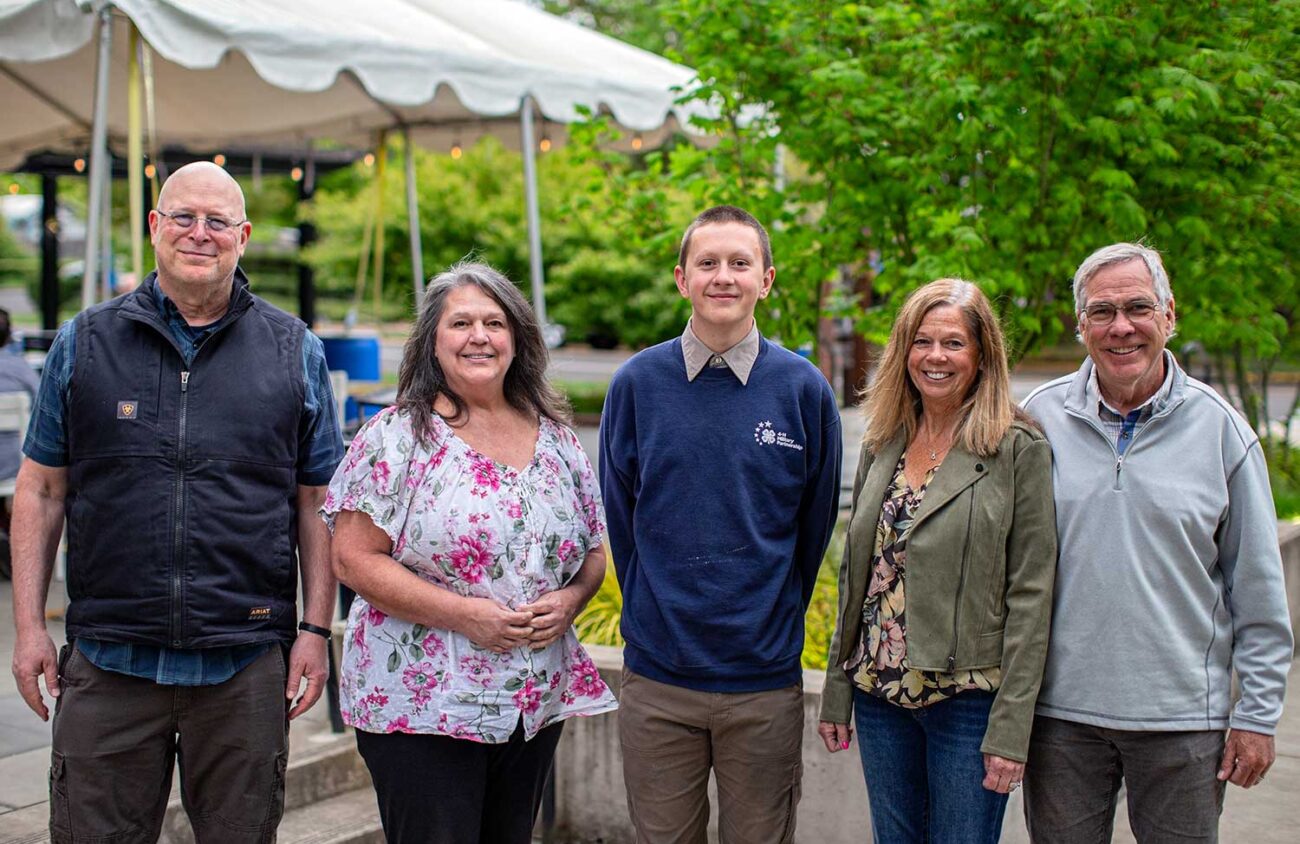Devonne Maxey was her father’s care provider leading up to his death in 2012, and she was the only one in the house with him when he died. She called emergency services, but “in a house full of people, I was alone,” she says.
“I know how that felt for me,” Maxey says, “so when I saw that we can be there for other people in that same situation, that’s what drew me. I want to be there for people.”
Maxey was a member of Trauma Intervention Program (TIP) of Lane County’s second graduating class in fall 2023. TIP is a national nonprofit that provides emotional first aid to victims, survivors, witnesses and bystanders of traumatic events. The Lane County chapter received funding in 2022 and began providing services in early 2023.
Since it began in 2023, TIP Lane County has conducted biannual training academies for new volunteers — 55 hours of in-person training followed by three months of ride-alongs with a graduated volunteer. The in-person training is led by TIP National trainers alongside emergency responders, survivors of trauma and local volunteers to best prepare the newest volunteers to respond in instances of trauma.
Bridget Byfield, TIP Lane County’s program director, says TIP receives around 20 calls a month, though the number varies “up and down, and there is absolutely no rhyme or reason” for the variation. She describes TIP’s services as “emotional CPR,” with volunteers providing emotional support on scene in the immediate aftermath of trauma.
This support includes notifying friends and family, advocating for survivors to emergency responders and medical authorities, arranging follow up appointments and simply being present when a survivor would otherwise be alone.
“You hope you don’t have to use it,” Byfield says, “but you’re going to be ready if you need to.”
TIP volunteers serve around three 12-hour shifts on-call each month, and are dispatched to the scene by the team leader on shift to provide emotional support on site.
“And then there’s the TIP dispatcher in the sky,” Byfield says. “It’s uncanny, the right volunteer goes on the right call every time. If there’s going to be somebody that you can connect with, that’s going to be the one that’s sent.”
Brice Zetlmaier, a volunteer with the TIP Teens program, says his role isn’t any different from the adult volunteers despite being 15 years old.
“I don’t go into it and feel like I’m less for being a teen,” Zetlmaier says. “Everyone in TIP has just been so caring, and so there’s that barrier I haven’t seen so far down in any other place I’ve volunteered for.”
The TIP Teens program provides the same services as the nonprofit’s standard intervention team, but teen volunteers also serve as back up volunteers for traumatic incidents involving children and teens.
Zetlmaier serves the same number of shifts as any other volunteer, he says, though he may get called when he’s not on shift if those on call need youth assistance.
“When we started having teens, I was thinking we’ll call them pretty much for the young person calls,” Maxey says. “No, Brice went on one where it was a very elderly lady.”
“Her response was that she never knew young people cared,” Byfield adds, “and it took her focus off her own trauma.”
Teens have volunteered with TIP Lane County since it first started, Byfield says, and their perspective is invaluable to the organization.
“I got a lot of pushback on it, on traumatizing our teens,” Byfield says. “But our teens know about trauma. They just need to have the skills to deal with it.”
Teens attend the same 55-hour training as adult volunteers.
Evan Bowen, a TIP volunteer since fall 2024, says Zetlmaier was empathetic even back in grade school, where Bowen read stories to his daughter’s and Zetlmaier’s class.
“There are all these different little flavors of people that you will see as little ones,” Bowen says, “and Brice was a rock back then. You would see people orbit around him.”
Bowen and Zetlmaier each went through the same 2024 TIP training, and Bowen says it is “uncomfortable from start to finish” as students are asked to roleplay in a variety of different trauma-related scenarios. “Our culture is pretty bad at dealing with raw human emotions,” Bowen says, “And this is just ‘wade in with your chin sticking out.’”
While the training is intensive, Byfield says it’s for good reason.
“Every time we send somebody out, I want it to be the A team,” she says. “I want it to be that dispatcher sending the best person out, and I want every one of them to go out pretty much sure they’re going to screw up and not do it right, but pretty much sure that they’re going to be there and they’re going to care.”
TIP Lane County’s next volunteer academy begins May 15 and will be the only session of the year. With 40 active volunteers, Byfield says, and a hope to get 20 more through spring training, “there’s only so many shifts per month.”
She adds, “We don’t want to be wasting people’s time if they’re not going to get called out.” Become a TIP volunteer by attending and participating in all eight training sessions from Thursday, May 15, to Saturday, May 24. Registration for training is $45. Visit TIPLaneCounty.org for more information.
Help keep truly independent
local news alive!
As the year wraps up, we’re reminded — again — that independent local news doesn’t just magically appear. It exists because this community insists on having a watchdog, a megaphone and occasionally a thorn in someone’s side.
Over the past two years, you helped us regroup and get back to doing what we do best: reporting with heart, backbone, and zero corporate nonsense.
If you want to keep Eugene Weekly free and fearless… this is the moment.
